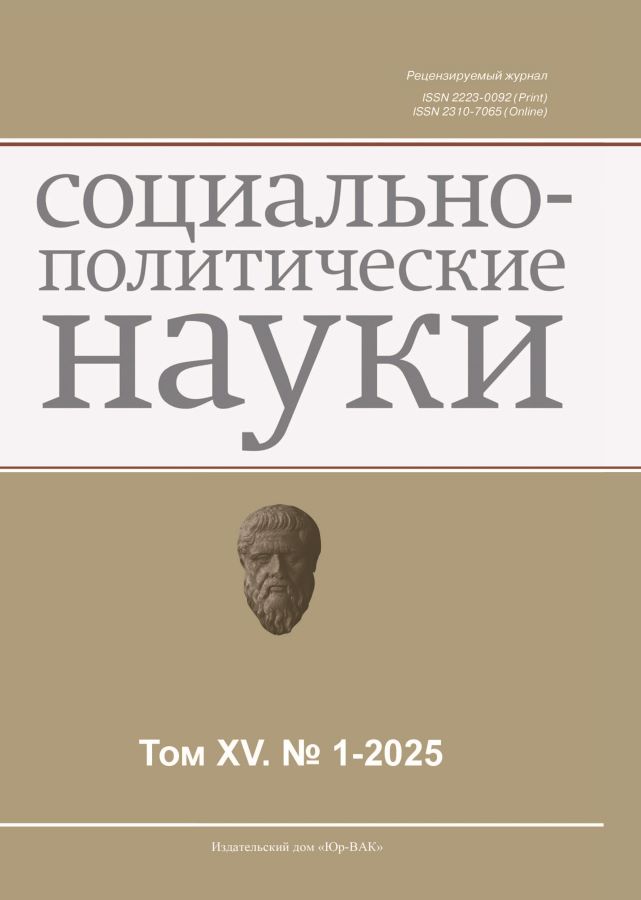A comprehensive situational approach to modeling politics as an extraordinary phenomenon
- Authors: Krutov A.V.1
-
Affiliations:
- Moscow Aviation Institute (National Research University)
- Issue: Vol 15, No 1 (2025)
- Pages: 15-23
- Section: History and Theory of Politics
- URL: https://journals.eco-vector.com/2223-0092/article/view/679134
- DOI: https://doi.org/10.33693/2223-0092-2025-15-1-15-23
- EDN: https://elibrary.ru/HMOBNB
- ID: 679134
Cite item
Abstract
The article examines politics as the practice of solving extraordinary problems that cannot be solved at the level of political and administrative management. The purpose of the work is to reveal the content of “extraordinary politics”, showing the process of its implementation and the possibilities of description using philosophical and mathematical methods. This policy reflects the unpredictable changes in the modern world, so its model has scientific and practical significance. Research objectives: to identify the difference between extraordinary policy and administration; to demonstrate the features of the structure and dynamics of the situation change; to propose a scheme of actions of the subject to turn the situation into an event using intuition and reflection, loyalty to the cause. The process of extraordinary politics includes recording signs of an aggravation of the situation; an idea of the trajectory of the transformation of the situation into an event; a risky decision to intervene (on a bet) in it; a sequence of small events adequate to the subject’s plan and the changing situation; consolidation of a complicated situation as a new historical event. Extraordinary politics as an object is described by a model for the development of human-sized systems with a socio-humanitarian dominant and the construction of a special subject. The subject locally constructs small events based on incomplete knowledge, reflecting, intuitively building the next intervention, optimizing the course of acceptable actions by being faithful to his duty to the event.
Keywords
Full Text
About the authors
Aleksandr V. Krutov
Moscow Aviation Institute (National Research University)
Author for correspondence.
Email: avkrutov@inbox.ru
ORCID iD: 0000-0003-4770-047X
Cand. Sci. (Polit.), Associate Professor
Russian Federation, MoscowReferences
- Bolnov O.F. Philosophy of existentialism. S.E. Nikulin (transl. from German and preface). St. Petersburg: Lan, 1999. 224 p.
- Gaman-Golutvina O.V. Modern comparative political science facing development challenges. The Prospects. Electronic Journal. 2020. No. 1 (21). Pp. 6–29. (In Rus.). doi: 10.32726/2411-3417-2020-1-6-29.
- Golikova M.S. “Fidelity” as an object of philosophical research. Part 1. Historical, Philosophical, Political and Legal Sciences, Cultural Studies and Art Criticism. Questions of Theory and Practice. 2017. No. 3 (77). Pp. 51–53. (In Rus.)
- Krivoguz I.M. On the subject of political Science. Social Sciences and Modernity. 1994. No. 3. Pp. 88–97. (In Rus.)
- Round table “Mathematics and Reality”. Bulletin of Vyatka State University for the Humanities. 2011. No. 1-1. Pp. 6–27. (In Rus.)
- Melvil A.Yu. New challenges for political science. Political Science. 2024. No. 2. Pp. 16–36. (In Rus.). doi: 10.31249/poln/2024.02.01.
- Nesterov A.Yu. Semiotics as methodology and ontology. Semiotic Research. 2021. Vol. 1. No. 1. Pp. 6–13. (In Rus.). doi: 10.18287/2782-2966-2021-1-1-6-13.
- Ranser Zh. On the edge of the political. B.M. Skuratov (transl. from French). Moscow: Praxis, 2006. 240 p.
- Rozin V.M. The concept of reflection: History, options, updating understanding. Actual Problems of Psychological Knowledge. 2024. No. 3. Pp. 19–43. (In Rus.). doi: 10.51944/20738544_2024_3_19.
- Soloduxo N.M. Situationality of being: Conceptual principles. Scientific Notes of Kazan University. Series: Humanities. 2012. Vol. 154. No. 1. Pp. 173–179. (In Rus.)
- Styopin V.S. Historical types of scientific rationality: Problems of demarcation and continuity. In: Philosophy in the plural. A.V. Smirnov, Yu.V. Sineoka (comp. and ed.). Moscow: Academic Project, 2020. 529 p.
- Tulchinskiy G.L. Three narratives of political science: Prospects for the interdisciplinarity of political research. Political Expertise: POLITEX. 2019. Vol. 15. No. 2. Pp. 174–200. (In Rus.) doi: 10.21638/11701/spbu23.2019.202.
- Fedorova M.M. Event: Modern approaches to the formation of the concept. Questions of Philosophy. 2019. No. 6. Pp. 40–49. (In Rus.)
- Shhedroviczkij G.P. Reflection in activity. In: Thinking – Understanding – Reflection. Moscow: Heritage of MMK, 2005. Pp. 64–125.
- Clarke J., Newman J. What’s the subject? Brexit and politics as articulation. Journal of Community and Applied Social Psychology. 2019. No. 29 (1). Pp. 67–77. doi: 10.1002/casp.2376.
- Fives A. Political reason: Morality and the public sphere. Basingstoke: Palgrave Macmillan, 2013. 202 p.
- Glaser E. Anti-politics: On the demonization of ideology, authority and the state. L.: Repeater, 2018. 250 р.
- Heywood A. Politics. Red globe press. Fourth ed. Basingstoke: Palgrave Macmillan, 2019. 519 p.
- Pierzchalski F. Politics as a fuzzy subject of research. In: Karwat M., Pierzchalski F., Tobiasz M. Constituents of political theory. 2021. Pp. 63–82. doi: 10.3726/b18809.
Supplementary files









